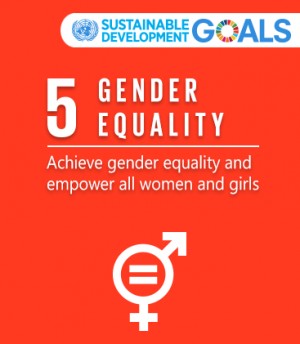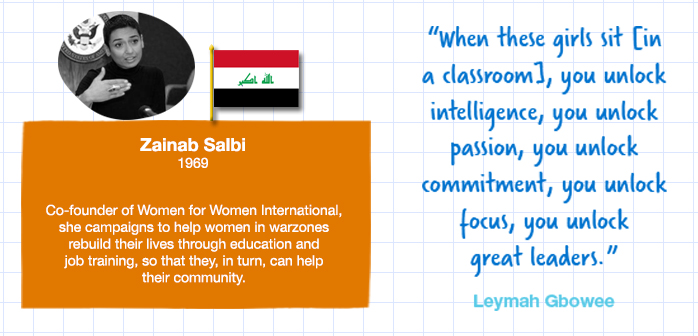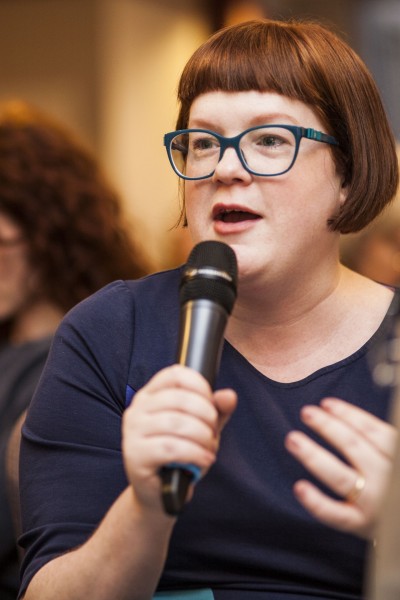Engender blog
Gender equality and the Sustainable Development Goals

A few weeks ago, the Scottish Council for Voluntary Organisations asked our Policy and Parliamentary Manager, Emma Trottier, to write a short blog about the UN Sustainable Development Goals (SDGs). Specifically, the SDG concerning gender equality and its link to the rest of the goals. Here she sets out what needs to happen for the goal to become a reality.
For those unfamiliar, the fifth of the 17 SDGs commits member states to achieving gender equality and empowering all women and girls. By 2030. Or 15 years from the time the SDGs were agreed to in 2015. Ambitious, isn’t it?
Postcard from Brussels: Feminist Economics and the European Women's Forum
Notes on minimum income, universal basic income and gender tax justice
Guest Post: Pioneering Women’s Education in Scotland
Educational access is still a matter that unfairly affects girls all over the world from living safely and prosperously. An education is not only empowering for women but also the best way to alleviate them from poverty. The Pioneers of Women’s Education have campaigned for girls to have equal access to education and the fight continues as more than two-thirds of the illiterate adult population are women. Here Plan International blog for Engender about Scotland’s educational pioneers.

Doing feminism in Europe
 I spent last weekend at the European Women's Lobby general assembly in Brussels.
I spent last weekend at the European Women's Lobby general assembly in Brussels.
The Lobby is the largest European umbrella of women's organisations, and its general assembly is an annual gathering of all of the national co-ordinations. Engender represents Scotland within the Lobby.
Some of you who follow European feminism or institutional feminist politics will have seen the Lobby pop up on Twitter, in our Friday Feminist Five mailers, but their work is much less familiar to other feminists in Scotland.
I thought I'd share five things about the Lobby (and Engender's involvement with it) that might be of interest.
1. What the Lobby's role is
The European Women's Lobby is a feminist policy and advocacy organisation that has two main roles. First, it lobbies European institutions, including the Commission and Parliament. Second, it supports feminist organisations in member states to participate in Europe-wide campaigning and lobbying.
2. How the Lobby is structured
EWL members fall into two categories: national co-ordinations and Europe-wide organisations.
The Lobby accepts one national co-ordination for each European member state, and leaves it up to the feminists in that state to create or select an organisation to be that national co-ordination. The UK's constitutional arrangements have posed a bit of a challenge to us in this regard, and I'll explain how we resolved it in just a moment.
Members vote at the general assembly for the EWL's board, and executive committee. All national co-ordinations are represented on the board, which meets physically twice a year. The executive committee meets more regularly.
There is also a secretariat, which is based in Brussels. The current secretary general of EWL is Joanna Maycock.
UN Special Rapporteur's appraisal of sexist UK causes stramash
If you've caught a newspaper, TV news report, or spent any time on social media over the last few days, you cannot have failed to notice the storm of protest that greeted Professor Rashida Manjoo's determination that there was sexism going on in the UK.
Professor Manjoo is the UN's Special Rapporteur on Violence Against Women, an independent and unpaid position with a mandate to identify the causes and consequences of violence against women within a state, and make recommendations for its elimination. The Special Rapporteur reports to the Human Rights Council.
Downloads
 Engender Briefing: Pension Credit Entitlement Changes
From 15 May 2019, new changes will be introduced which will require couples where one partner has reached state pension age and one has not (‘mixed age couples’) to claim universal credit (UC) instead of Pension Credit.
Engender Briefing: Pension Credit Entitlement Changes
From 15 May 2019, new changes will be introduced which will require couples where one partner has reached state pension age and one has not (‘mixed age couples’) to claim universal credit (UC) instead of Pension Credit.
 Engender Parliamentary Briefing: Condemnation of Misogyny, Racism, Harassment and Sexism
Engender welcomes this Scottish Parliament Debate on Condemnation of Misogyny, Racism, Harassment and Sexism and the opportunity to raise awareness of the ways in which women in Scotland’s inequality contributes to gender-based violence.
Engender Parliamentary Briefing: Condemnation of Misogyny, Racism, Harassment and Sexism
Engender welcomes this Scottish Parliament Debate on Condemnation of Misogyny, Racism, Harassment and Sexism and the opportunity to raise awareness of the ways in which women in Scotland’s inequality contributes to gender-based violence.
 Gender Matters in Social Security: Individual Payments of Universal Credit
A paper calling on the Scottish Government to automatically split payments of Universal Credit between couples, once this power is devolved to the Scottish Parliament.
Gender Matters in Social Security: Individual Payments of Universal Credit
A paper calling on the Scottish Government to automatically split payments of Universal Credit between couples, once this power is devolved to the Scottish Parliament.
 Gender Matters Manifesto: Twenty for 2016
This manifesto sets out measures that, with political will, can be taken over the next parliamentary term in pursuit of these goals.
Gender Matters Manifesto: Twenty for 2016
This manifesto sets out measures that, with political will, can be taken over the next parliamentary term in pursuit of these goals.
 Scottish NGO Briefing for UN Special Rapporteur on Violence Against Women
Joint briefing paper for the UN Rapporteur on Violence Against Women.
Scottish NGO Briefing for UN Special Rapporteur on Violence Against Women
Joint briefing paper for the UN Rapporteur on Violence Against Women.

Newsletter
Sign up to receive our newsletter here:
Sign up to our mailing list
Receive key feminist updates direct to your inbox: